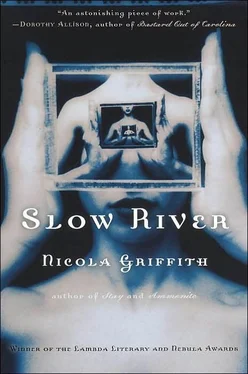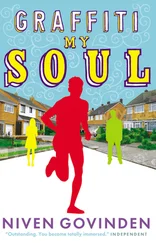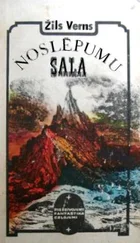Lore shivered.
“You’ll be warm where we’re going,” Spanner said. She led Lore around the pond toward a Victorian conservatory, all white wood and glass greenhouse, with clouds in every shade of gray scudding along its panes. Lore followed Spanner past the little window where a bored employee sold seedlings and saplings, and inside.
It was like walking into a line of hanging laundry, still hot and wet and smelling of earth and sunshine and fresh rain. She felt as though she had stepped through a mirror into another world, where the ash and charcoal, the grim mercury and zinc and lithium vanished into the living colors of the tropics. A bird shrieked. The light was bright, and reflected from the vivid orange of half fruits at the bottom of the aviary cages, on the flash of a purple-throated hummingbird, on huge, blowsy red flowers.
“Heliconia…” Lore said, in wonder, and lifted her face to smell. The ceiling was three stories high, and the whole space was lush with greenery.
“How the hell did you know that?”
“I’ve been in the jungle. Before.” Before all this.
She felt suddenly that her carapace had been ripped off, like a shiny scab, and she was open, raw and pink, to everything: the brilliant sherbet green of a parakeet’s tail; to a dozen variations on brown—leaf mold, dead moss, peat, bark, beetles; to the crunch of their feet on the gravel paths that wound between the vines and palms and trailers that spanned the fifty or sixty feet from loam to glass ceiling. It was these plants that seemed to interest Spanner.
Spanner stopped in front of an enormous green tower with trailing aerial roots and leaves that were fringed and full of natural holes. Lore tilted her head up, up, and was lost in the soaring spindle-weave of foliage, the tracery of different greens overhead, the architectural density of it all, like a great, Gothic cathedral.
She wondered why Spanner had brought her here.
“Monstera deliciosa, that’s its Latin name,” Spanner said. “The people who first brought it back from the jungle called it the fruit salad plant, because that’s what the fruit tastes like.” Her face was tilted up at forty-five degrees, and Lore could imagine her tramping through the tropics, braving unknown hazards to collect specimens, just to say she’d been there, a new place. But there were no more new places. Lore suddenly thought of Stella. Her sister and Spanner were very alike. They were the people who suffered because they were made for exploring the edges, pushing the boundaries. But the only boundaries left were inside.
She wanted to ask Spanner why she was letting down her barriers. Why now? She asked, instead: “Where does it come from?”
Spanner shrugged. “Nowhere, now, except hothouses.” She lifted up her face again. “I’ve been coming here for six years, watching for fruit. I wonder what they’d really taste like—what kind of fruit salad? Once I dreamt I found a pineapple as big as a barrel on the floor. When I ate a bit, it tasted like strawberries.” Her smile twisted at the last minute. “Imagine calling something that grows fruit salad a cheese plant.”
Later, as they walked the half mile home, coats wrapped tight against the winter chill, Lore silent and waiting, Spanner suddenly said, “It’s my birthday tomorrow.”
Lore looked at Spanner’s inwardly focused eyes and knew it would be pointless to ask her how old she was.
When they got back to the flat, Lore took off her jacket and went into the kitchen to make coffee. When it was done, she headed back to the living room but paused in the doorway. Spanner, still in her coat, was staring into empty space. Lore had never seen her look so vulnerable. She didn’t think she had made a sound, but Spanner’s gaze came back to the room, and focused on her. “I’m going out.”
“But—”
“What?” Spanner’s voice was harsh.
Lore looked at the cup in her hand. “Nothing.”
“Don’t wait up.”
Lore stood where she was until the front door closed; then she went back into the kitchen and carefully poured Spanner’s coffee down the drain. After a moment, she poured her own away, too.
Moving slowly, numbly, trying not to think, not to let in the pictures of Stella and Spanner, their loneliness—no, their emptiness—she picked up her coat. She buttoned it deliberately.
Don’t think about it, she told herself again, only this time it was the outside she was trying not to think about, the big wide world full of open sky and strangers who might take a casual look at her, then look again, then open their mouths to shout, to point… She opened the door and headed back to the conservatory.
It was four in the morning and all the lights in the flat were off when Spanner got back. Lore heard the chink of a bottle against the wall. “Put the light on before you kill yourself,” she called. Then she got out of bed and watched from the doorway as Spanner tugged off her jacket, tripped over the rug, saw the four-foot cheese plant, and stopped.
Lore walked barefoot into the living room. “Happy birthday.”
Spanner started to cry. Lore held her.
* * *
When the shift finally ended I was almost glad I had to go to the Polar Bear to meet Spanner. At least while I was worrying about her and my PIDA, about Magyar checking up on Bird’s records, I wouldn’t be sweating over the score of things that could go wrong at the plant.
Outside it was cold and clear. Winter was coming. When I got to the Polar Bear my face was red and my hands tingled with cold. Hyn and Zimmer were already there, with Spanner. I got myself a drink before sitting down. I took off my jacket and nodded at them.
Zimmer nodded back. “Spanner tells me what you want. We don’t get requests like that very often.”
“It’s rare,” Hyn agreed.
“And we don’t know of anyone who’s holding what you need.”
“But you could find out,” Spanner said.
“Oh, yes,” Hyn said, “but do you really want us to?” I took a sip of my beer. It was cool and nutty. “They’re not the kind of people it’s wise to know.”
Spanner laughed. “Nor am I. Nor are you, not really.” No one said anything about me.
Hyn and Zimmer looked at each other. They seemed troubled. “Do you really need this equipment?”
“Yes.”
Zimmer touched my wrist with one brown gnarled finger. “And you?” His eyes looked more like berries than ever, and still bright, but older somehow.
I nodded reluctantly. “Yes.”
Hyn sighed. “Then we’ll do it. But it’ll be expensive.” We all knew she was talking about more than money.
“How much?”
Hyn shrugged, looked at Zimmer. “Fifteen thousands. Maybe more.”
That was more than I had expected. “I’m not—”
“We’ll get the money.”
I looked at her. “Spanner, I don’t—”
“We’ll have the money,” Spanner repeated to Hyn and Zimmer. “Just let us know when and where, and you’ll have it.”
I had never seen them look so unhappy, but they nodded and stood. They left their unfinished drinks on the table.
Hyn and Zimmer were scared, but danger was just an adventure to Spanner. It put her in a good mood. We sipped at our beer in silence. This was not the only kind of danger I was in. If Magyar decided to use some budget on a backcheck of Bird’s record, she would see straightaway that I knew more than I had a right to. And then she might be able to justify a deeper search. And that meant she would find out Bird had died a while ago. And then I was in real trouble. Might as well take advantage of Spanner’s good mood.
“I changed my mind about the PIDA records. I need that information substituting as soon as possible.”
“When?”
Читать дальше












